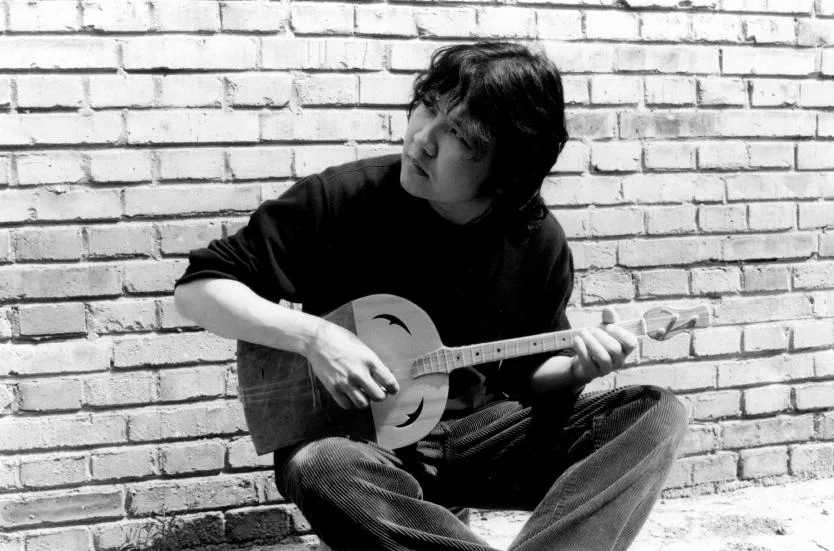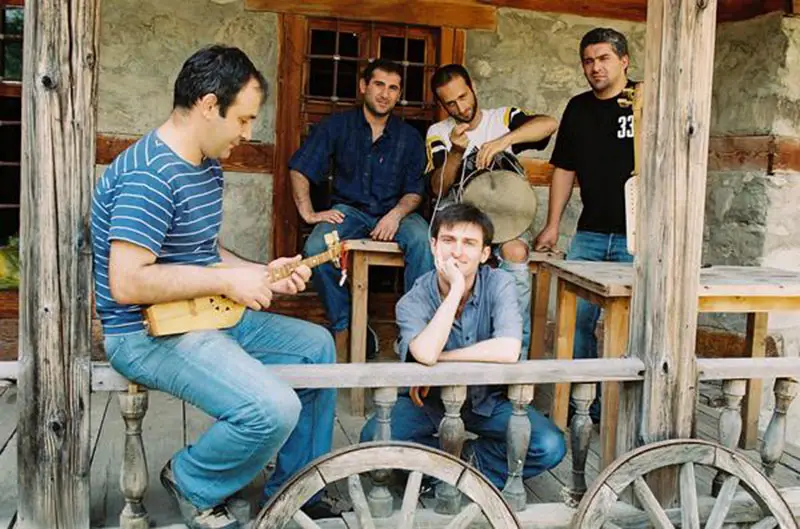Singer, songwriter, and multi-instrumentalist Mamer Rayes has been an active musician for more than 30 years. While his style of music has shifted over time, it remains deeply rooted in the language, instruments, and folklore of the Khazak culture in which he was raised.
Mamer was born in Xinjiang, an autonomous region of northwestern China. One of ten children in his family, he grew up surrounded by folk songs and stories and playing traditional instruments like the dombyra lute (Kazakh: домбыра). Xinjiang is home to many different languages and traditions — Kazakhs are among the nearly 40 different ethnic groups that reside there, including Mongolians, Khalka, Uighurs, Uzbeks, Tatars, and Russians. Much of Mamer’s music is sung in Kazakh, his native language, and he cites the Khazak folk songs he heard in the grasslands of his hometown Qitai as his inspiration. “I always stay awhile with the old people in the mountains, learning their songs and traditions,” he describes in an interview with Realworld Records, who produced his album Eagle in 2009. “Without this a whole way of life will be lost to the young generation. I want to breathe new life into the poems and songs I grew up with.”
As he approached adulthood, Mamer moved to Xinjiang’s capital city of Urumqi, where he started attending music college. He soon dropped out, and instead found voiceover work with a local TV station. Urumqi’s rock music scene was growing at the time, and Mamer gathered some renown as a talented guitarist. He made decent money playing for an 80s cover band, and he recorded his own original songs for the first time with a band called Jonggar (named after the Junggar Basin, where Qitai is located).
Soon Mamer gained the respect not only of rock musicians in Urumqi, but also of those in Beijing, where he moved in 2002. It was here that he formed his most well-renowned band, IZ. Named after the Kazkah word for “footprints,” IZ more specifically references “footprints left by tradition” and is widely thought to be the beginning of China’s alt-country genre of music. The band played contemporary arrangements of traditional Kazakh songs, utilizing not only dombyra but also the kobyz (Kazakh: қобыз) and jaw harp. Their first demo “Êdil-Jayeқ” (the title referring to two rivers: the Volga and the Ural) was recorded in 2003, and featured lyrics based on the work of 15th century Khazak poet Asan Kaigy.
This demo paved the way for a deal with Realworld Records, a British label, which in turn led to Mamer’s solo 2009 album “Eagle.” This was his only release to gain significant international acclaim. It is the bulk of his listens on music streamlining platforms like Spotify, where “Mountain Wind” and “Kargashai” are the most-listened tracks. On this album, he uses not a dombyra, but a guitar tuned to achieve the same sort of sound. “I use open tunings,” he says, “so although the sound is louder and more resonant the guitar becomes like a dombyra.”
Despite its commercial success, Mamer was not happy with Eagle. He didn’t like the “world music” context in which it was produced, which, in his opinion, both led to lower production quality and stereotypical perceptions. In his more recent work, his sound turns more experimental, featuring improvisation with everything from dombyra to electric guitar. Nonetheless, he continues to draw inspiration from old Kazakh songs and writing. “Although my band uses different instruments and sounds, my music is rooted in our tradition,” he affirms. “So we are creating a new style — a new music of the grasslands. We are making a new tradition.”
Mamer’s music can be found on Youtube, Spotify, and Amazon. His smaller albums and recordings can be found online in a profile for The Wire written by Mabu Li.











